Bragg: Home loans for only the rich risk “killing Australian” housing dream
APRA has kept its strict 3 per cent lending buffers amid concerns over inflation and high debt levels, which according to NSW Liberals senator Andrew Bragg makes home ownership harder.

NSW Liberals senator Andrew Bragg has warned lending laws and the housing market risked “killing the Australian dream” of home ownership, amid a move by the prudential regulator to hold steady on borrowing rules.
The Australian Prudential Regulation Authority on Monday said it would hold its mortgage serviceability buffer at 3 percentage points above the reference rate, with no lending limits, in a move that may upset banks and borrowers who had been clamouring for loan relief.
APRA requires banks to assess borrowers for home loans, plus a further 3 per cent, in a bid to stress-test households for a further increase in interest rates.
Banks have called for APRA to relax the rules, amid competition from unregulated non-bank lenders, while critics including Senator Bragg have questioned the regulator’s tough approach.
But APRA has pushed back on banks, saying there was ample scope to rethink risk appetites.
APRA said it was holding its rates ceiling steady after an assessment of Australian and international economic conditions, coming ahead of the Reserve Bank’s rates meeting next week.
APRA said high levels of household debt and inflation “still above the Reserve Bank of Australia’s target range, as well as ongoing geopolitical instability” were all key areas of consideration.

Market watchers have said the RBA may be forced to raise rates in August after a string of stubbornly high inflation figures and a continued climb in asset prices.
APRA chair John Lonsdale said credit growth had moderated from its pandemic peaks.
“High debt-to-income and high loan-to-valuation ratio lending make up only small proportions of new lending,” Mr Lonsdale said. “Lending standards remain sound, with banks able to make exceptions to their serviceability policy when it is prudent to do so.”
APRA said new housing lending “remains sound”, with arrears levels rising but below pre-Covid-19 peaks.
But Mr Lonsdale said APRA would continue monitoring bank lending and make changes to buffers if “necessary”.
The regulator also said it would hold its countercyclical capital buffer at 1 per cent of risk-weighted assets, in a requirement for how much cash lenders must hold on hand.
Senator Bragg, the opposition’s assistant home ownership spokesman, took aim at the regulator’s standstill on standards, saying its lending rules were making it “very hard” for first-home buyers to crack the housing market.
“The risk management by APRA generally has prioritised financial stability over everything else and that is a reasonable position,” he said. “But there might be a way you can maintain unquestionably strong banks but also help first-time buyers.”
Senator Bragg said he hoped to see an examination of responsible lending laws and regulation as regulated entities faced an explosion in competition from unregulated private credit and non-bank operators.

“We want to make sure that first-home buyers can safely access credit right now,” he said. “If [ANZ chief executive] Shayne Elliott is right, and you’re going to be a rich person to get a loan in Australia, then we are killing the Australian dream.”
Senator Bragg said regulators should look to assist first-home buyers, either by relaxing lending requirements or making it tougher for investors to access finance.
“If there is a way to maintain unquestionably strong banks, but tilt the scales in favour of first-home buyers, then we should do that,” he said.
He said state and local governments also had a role to play in the supply of housing, while the federal government could control immigration numbers.






To join the conversation, please log in. Don't have an account? Register
Join the conversation, you are commenting as Logout